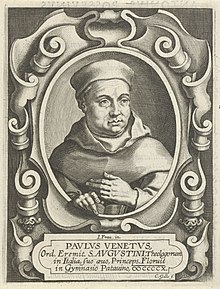Paul of Venice (orPaulus Venetus; 1369–1429) was a Catholic philosopher, theologian, logician and metaphysician of the Order of Saint Augustine.
Paolo Nicoletti Veneto
| |
|---|---|

Paul of Venice
| |
| Born | c. 1369 |
| Died | 15 June 1429(1429-06-15) (aged 59–60) |
| Nationality | Italian |
| Education |
|
| Era | Medieval philosophy |
| Region | Western philosophy |
| School |
|
Main interests | Metaphysics, logic, ontology, epistemology |
Paul was born, according to the chroniclers of his order, at Udine, about 1369 and died at Venice on 15 June 1429,[2]asPaolo Nicoletti.[3] He joined the Augustinian Order at the age of 14, at the convent of Santo Stefano in Venice. In 1390 he is said to have been sent to Oxford for his studies in theology, but returned to Italy, and finished his course at the University of Padua, becoming a Doctor of Arts and Theology in 1405. He lectured in the Universities of Padua, Siena, Perugia, and Bologna during the first quarter of the fifteenth century.[4] He was also a teacher to Paolo da Pergola.[5]
Paul was also appointed Prior General of the Augustinian Order in 1409 by Pope Gregory XII, and also served as an ambassador to the Republic of Venice. Paul was one of the theologians called to Rome in 1427 by Pope Martin V to defend the orthodoxy of St. Bernardino of Siena, occasioned by Bernardino's use of inscriptions of the name of Jesus in worship. In 1429, Paul died in Padua, while he was completing his commentary on Aristotle's De Anima.[6]
Paul's philosophy has been categorised within the realist tradition of medieval thought.[1] Following on from John Wycliffe and the subsequent Oxonians who followed him, Paul further developed this new brand of realism, and further renewed Walter Burley’s opposition to nominalism. Paul's metaphysical theses are rooted fundamentally in Scotist thought. Duns Scotus maintained the doctrine of the univocity of being and the existence of the universal forms of objects outside of the person's mind. He also maintained Scotus' notion of the real identity and the formal distinction between essence and being, alongside the notion of "thisness" as the principle of individuation.[7] Paul was also simultaneously influenced by other thinkers of the Scholastic period, including the Dominican thinkers Albert the Great and Thomas Aquinas, and his fellow Augustinian, Giles of Rome. Paul also critically engaged with the works and doctrines of fourteenth-century nominalists such as William Ockham, John Buridan, and Marsilius of Inghen, and sometimes gauged these thinkers' theses against each other to undermine their positions.[8]
His writings show a wide knowledge and interest in the scientific problems of his time.
Translation of the 1472 Edition with introduction and notes by Alan R. Perreiah.
Edited and translated by Alan R. Perreiah
Edited with an English translation and notes by Norman Kretzmann.
Edited with an English translation and notes by Patricia Clarke.
Edited with an English translation and notes by C. J. F. Williams.
Edited with an English translation and notes by Alexander Broadie.
Edited with an English translation and notes by George Edward Hughes.
Edited with notes on the sources by Francesco del Punta; translated into English with explanatory notes by Marilyn McCord Adams.
Edited with an English translation and notes by E. Jennifer Ashworth.
Attribution